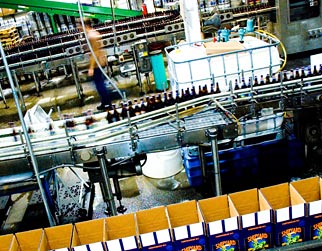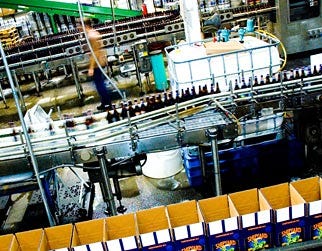Packaging Education: Need for training is increasing, says IoPP
March 11, 2015

 Jeff Lewton, an end-of-line packaging operation specialist with Silgan Plastics in Norcross, Georgia, is responsible for selecting the most effective shipment packaging for the plastic bottles produced at Silgan plants. On the surface, this seems a straightforward task: how many bottles, how big, what size corrugated case do we need, how many can we place on a pallet for the most cost-effective shipping?
Jeff Lewton, an end-of-line packaging operation specialist with Silgan Plastics in Norcross, Georgia, is responsible for selecting the most effective shipment packaging for the plastic bottles produced at Silgan plants. On the surface, this seems a straightforward task: how many bottles, how big, what size corrugated case do we need, how many can we place on a pallet for the most cost-effective shipping?
That might have been the case as recently as five years ago; today, things are different. First of all, Lewton has many more packaging methods today to choose from, including cases, trays, flat corrugated sheets and various stretch wrap mate-rials to secure tray and pallet loads. The material the bottles are formed of can determine whether they require a protective case or can be trayed and stretch wrapped.
‘”Today’s emphasis on light-weighting bottles, for instance,” he points out, “doesn’t mean that the shipping container can be lighter. In fact, it may have to be heavier, to prevent damage to the more delicate bottles in transit. I have to be aware of how other parts of our operation affects what I do.”
In addition to his own company’s requirements, the customer’s warehouse handling requirements may determine packaging, shipment size and configuration, and that customer’s recycling standards for disposal of the packaging can limit the choice of packaging materials. Changes taking place in the packaging industry at large and in society as it increasingly places demands on packaging also affect the decisions he makes.
At the other end of the spectrum, Mary Slaga is a packaging sales consultant with packaging distributor TricorBraun, a leading designer and source of plastic bottles, glass bottles, closures, and other rigid packaging components. Rather than working within a single facility, like Lewton, her work responsibility takes her into a wide variety of companies in order to provide them with the rigid packaging solution that best meets their needs. To work effectively, and also to win the trust of these customers, she needs to be able to grasp quickly what is taking place within each plant she visits.
She explains that being more knowledgeable about the entire range of packaging helps her to communicate with customers in explaining the features and benefits of various packages TricorBraun can provide or design. But at the same time, communication is a two-way street.
“I also am better able to understand their description of the entire packaging operation in their facility, not just the part that I am directly involved with. And that helps me build a stronger relationship with them.”
IoPP Education and Certification
Both of these companies invest time, effort and money in educating their employees, from conducting in-house classroom training sessions to arranging “field trips” to various suppliers to see packaging being manufactured. But both also place a high value on the educational resources of the Institute of Packaging Professionals (IoPP), supporting membership for their employees in the organization and its local chapters and encouraging them to study for and take the examination to become a Certified Packaging Professional (CPP).
Since 1972, IoPP has awarded the designation “Certified Packaging Professional (CPP) to professionals who have demonstrated significant packaging industry expertise and experience, measured through a rigorous study and testing process. To date, more than 1,500 packaging professionals have attained CPP status. (Details of the certification requirements and process are available at www.iopp.org.)
Candidates prepare by studying Walter Soroka’s book Fundamentals of Packaging Technology, published by IoPP, either through taking a course offered by IoPP or through individual study. Many companies encourage candidates to study together, and provide time away from work responsibilities for these study groups.
The value of professional education
Both Lewton and Slaga are CPPs, and both have seen directly the value of that professional education.
For Slaga, certification has affected the way new sales contacts respond to her, right from their first meeting.
“When they see CPP on my card, they tend to see me as qualified and informed about packaging even before they know me. That is an invaluable asset for a sales consultant.”
Lewton originally earned the CPP when he was with Georgia-Pacific’s Packaging Division, working with corrugated packaging. It was later a factor in his joining Silgan Plastics.
“CPP certification was one of the qualifications my future manager was looking for in applications. After I was hired, he encouraged me to maintain that certification, because it would be useful in my job, but also as a credible introduction when I called on customers with our sales representatives.”
Lewton did recertify as a CPP in 2008, and he has found that having the designation on his business card does build credibility with vendors and customers.
Slaga’s colleague at TricorBraun, Director of Marketing Suzanne Fenton, CPP, also recertified in 2008. In addition to her marketing duties, Fenton also trains both TricorBraun personnel and customers in technical packaging subjects. She finds that the certification helps her with both audiences.
“What we call our ‘Bottle School’ covers the basics of designing and making bottles, closures and other packaging elements that we sell. It is useful for our customers, and certainly for our employees, to have this background in the entire spectrum of package design and manufacturing. Studying Walter Soroka’s book Fundamentals of Packaging Technology gave me the knowledge, but the CPP earns me credibility, and that’s always important for a teacher.”
Career benefits
At The Scotts Company LLC, the maker of Scotts®, MiracleGro®, Roundup® and Ortho® lawn and garden products, Director of North American Packaging Development Bryan Mahoney deals with an extremely varied range of packaging, from spray bottles and shaker canisters to folding cartons and flexible packaging. He, too, has learned to value the CPP designation.
“As a director who hires staff, I see a lot of resumes,” says Mahoney. “When I see ‘CPP’ after an applicant’s name, it tells me not only that he or she has broad knowledge of packaging technology, but also had the commitment to the packaging profession to complete the rigorous effort that studying for and taking the examination requires.”
Senior Packaging Engineer Doug Compton, for instance, came to Scotts from IBM, where his main task was to develop industrial packaging for mainframe computer systems and components. When he applied at Scotts, he was concerned that his resume would not accurately reflect his packaging knowledge and flexibility, given the niche packaging experience he gained with IBM.
But the fact that he was a CPP outweighed the narrow focus of his work experience. He has now worked at Scotts for two years, developing both rigid and flexible packaging for numerous consumer products.
Dr. Kim Riley, PhD, is Program Manager for Global Packaging and Labeling for Shire PLC, a global specialty biopharmaceutical company. Her primary responsibility is to develop global packaging and labeling for the company’s “orphan” or specialized drug products, a market segment that requires a solid knowledge of specific country requirements involved in the introduction of new drugs. In that position, she has to communicate to senior management, as well as to many other disciplines, packaging and labeling requirements and limitations that those not directly involved in packaging are not aware of. She had a similar need in her previous position, as a manager/principal packaging engineer for Boston Scientific Corporation, and in both situations recognized that professional success depended on the success of those communications.
Riley recognized early on that, in addition to a bachelor’s degree in packaging engineering, a master’s degree in plastics technology, and a doctorate in international business administration, her day-to-day work would be further enhanced by adding the CPP designation to her academic credentials.
“Anything that furthers your knowledge base, and furthers your ability to explain and communicate what you’re doing, is always a benefit.”
Continuing education
Like medical and legal professionals, who have to earn Continuing Education Credits (CEUs) to maintain their licenses, many packaging professionals—and their companies––recognize that they have to continue their education to keep current. In an industry that is continually changing, to stay fixed in today’s technology would be a serious limitation.
Many packaging professionals, including those quoted here, are active in their local IoPP chapters. Chapter meetings offer opportunities for networking and socializing, but their activities are primarily educational in nature, with lectures by specialists on new technologies and visits to member production facilities to explore technology at work.
What these professionals have in common, both in becoming certified professionals in the first place, and in continuing their educational activities, is a commitment to growth: growth of their professional abilities and to enhance their personal success and their success as important members of their companies.
In today’s world of quickly-evolving packaging technology, changing external industry and governmental controls, and increasing consumer demands, professional education is more important than ever to maintaining that commitment. Not to grow would mean to fall behind.
James Peters, CPP is the Director of Education and Certification for the Institute of Packaging Professionals.
The Institute of Packaging Professionals (IoPP) is a professional trade association dedicated to creating networking and educational opportunities that help packaging professionals succeed. For further information about IoPP and its programs, contact The Institute of Packaging Professionals;
1601 Bond Street, Suite 101; Naperville, IL 60563.
Phone: 630-544-5050.
Fax: 630-544-5055.
Email:[email protected], or visit the organization web site atwww.iopp.org.
Source: IoPP
Photo by Brent-Danley
Click Here Now to Get FREE Newsletters from Packaging Digest
/subscribe.asp
.
You May Also Like


